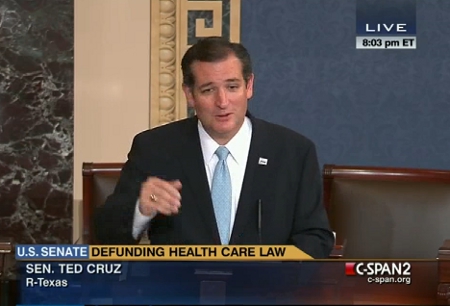Chris Gilson looks at the best in political blogging from the Beltway and across the States.
Budget battles and the shutdown threat
The US government’s financial year ends this coming Monday, September, 30th. This week was dominated by budget battles in both the House and Senate. On the weekend, Roll Call previewed the week’s showdown, writing that after the House passed a Continuing Resolution that de-funded Obamacare, Senate Democrats would be likely to send a ‘clean’ bill back, with the funding reinstated. The Hill’s Congress blog says that the bill is facing the Senate’s ‘parliamentary minefield’, which Republicans will have to tiptoe through, and filibuster if necessary, but The American Prospect argues that the Senate’s ‘arcane rules’ may actually save the country.
Meanwhile, The Political Carnival says that Republicans are willing to shut down the government because it represents the wishes of the American people, while the National Journal says that Americans are actually sharply divided over repealing Obamacare, with 49 percent arguing it should be kept, and 44 percent saying it should be repealed.

Red State writes that Republicans are fighting Democrats over the budget with ‘one arm tied, and a knife in our backs’, because most Republicans are actually happy to rubber-stamp Democratic programs. On similar lines on Monday, American Thinker says that Republicans are turning on one another as the Senate’s budget vote loomed. Roll Call says that the rift in the Republican Party is worse than the one that the Democratic Party experienced in the 1980s. Hit & Run reminds us that we should remember to blame Senate Democrats for the threat of a shutdown as well, as they seem to have had an inability to pass budgets in recent years.
Texas’ Junior Republican Senator, Ted Cruz, had a starring role in this week’s budget battle. On Sunday, The Lonely Conservative writes that Republicans should stop criticising him for his tough stand on de-funding Obamacare, arguing that while the fight might not be an easy one, it is still worth fighting. American Thinker ponders whether or not Cruz is the new Ronald Reagan, given his direct action and refusal, like Reagan, to play the ‘Washington game’. On Tuesday, Cruz began what became an over 21-hour Senate speech, something that The Atlantic terms a ‘fauxlibuster’ also arguing its absurdity, given that it would not stop Obamacare from being funded, and that he delayed the bill’s passage by the Republican House on Friday. Caffeinated Politics is not so generous, calling Cruz’s action ‘governmental terrorism’. Wonkblog says that Cruz’s long talk to the Senate is actually the fourth longest in history. Following the conclusion of his epic speech, Roll Call says that while his speech gained him attention, its tangible benefits to him and his party are much harder to measure. Outside the Beltway looks at the differences between Cruz’s ‘filibuster’ and Texas State Senator Wendy Davis’s filibuster of an abortion bill.
As the week continues, and the threat of a government shutdown seems more likely, Wonkblog writes that a shutdown could cost the US billions, to say nothing of the effects that the uncertainty it is creating on consumer and business confidence. Outside the Beltway reckons that a shutdown is (probably) unlikely, given that in previous years, a deal has been made. The Political Carnival looks at what will actually be shut if the government does shutdown; mostly discretionary spending such as government offices, national parks, and school programs.
Government and the Beltway
On Sunday, The Political Carnival covers a potential Supreme Court ruling that will allow a large increase in donations for political candidates, something that would benefit Republicans more than Democrats, as they have more large donors.
The American Prospect looks at the Republican governors who have been pushing for the expansion of Medicaid in their states, despite the strong objections of the Tea Party. Their eyes are on the votes of their citizens who would get health insurance under their proposals.
If and when the Congressional budget battle is solved, the next fight will be over the debt ceiling, which the government is likely to reach at some point in October. With this in mind The Foundry has six reasons why the national debt continues to rise. Wonkblog says that the markets are now beginning to worry that the US might default on its debt, with a recent spike in bond prices. American Thinker says that no-one can really predict what will happen if the debt ceiling isn’t raised, as the situation would be completely unprecedented.
Looking ahead to the mid-term elections in 2014, the National Journal says that Democrats need to keep an eye on independent voters – who are currently tilting towards the Republicans. Meanwhile, Via Meadia says that Democrats are likely to move towards the left for the 2016 election, which could spell trouble for Hilary Clinton’s presidential aspirations. Smart Politics makes an interesting point that US House campaign websites show the American flag 39 percent less than they did in 2010.
Hit & Run looks at a new survey that says that 60 percent of Americans think that the federal government is too powerful.
It’s not all doom and gloom for Congress, as Roll Call reports that members had $1.7 million worth of gifted free trips this past August.
Syria and foreign policy
With last week’s tentative joint agreement with Russia for the Syrian regime to give up its chemical weapons, attention in Congress has been turning towards last year’s attacks on the American diplomatic mission in Benghazi. The Hill’s Congress blog warns Congress not to take their focus away from Syria and ensure its lessons are learned. Meanwhile, The Foundry says that the administration’s actions over Syria show that the ‘Obama doctrine’ is in ruins, and that Russia is now a foreign policy leader in the Middle East. On the other hand, The American Prospect praises Obama’s recent policies towards Syria and Iran as being realistic. Later in the week, The Monkey Cage argues that the best way to avoid bombing Syria is to…authorize the bombing of Syria.
This week, Secretary of State John Kerry signed a United Nations treaty on arms regulation which requires signatories to set up a ‘national control list’ of guns. Doug Ross argues that while the treaty will never be ratified by Congress, it will give President Obama cover to ignore Congress and the Constitution, in order to control guns to a greater degree.
The economy, society, and rollout of Affordable Care
On October 1st, the first health insurance exchanges under the Affordable Care Act are due to open. The Lonely Conservative argues that these Obamacare exchanges will actually limit people’s healthcare choices. Meanwhile, The Foundry writes that in the lead up to their opening, many exchanges have been struck with glitches and delays.
On Sunday, Informed Comment says that demonstrators in towns and cities across America called on President Obama to reject proposals to extend the Keystone XL pipeline, which would accelerate the extraction of Canadian tar sands for refining in the US. Meanwhile, Via Meadia says that the US needs to start exporting its ‘glut’ of natural gas. Still on energy policy, Doug Ross says that the Environmental Protection Agency’s new regulatory standards for coal power plants may threaten the 800,000 jobs in the US coal industry.
The Lonely Conservative writes that the White House is trying to keep some unpopular provisions in its immigration bill, including allowing immigrants who are also criminals to stay in the country. Meanwhile, Reason looks at government border security programs to prevent illegal immigration, and argues that they have been ineffective, and that they may have made the problem worse.
As Congress debates potential cuts to the food stamp program, Wonkblog looks at why 47 million Americans need them. It’s mostly because of the recession, they write. In a similar vein, The American Prospect investigates how much it would cost to eliminate poverty in America. They argue that around $175.3 billion would do the trick, or just over 1 percent of GDP.
On Thursday, Caffeinated Politics congratulates former President George HW Bush on being a witness at a recent same-sex marriage.
Across the States
Northeast
The National Journal says that Maine’s democrats are upset that the newly announced Independent candidate for the gubernatorial race in 2014 may split the vote and help the Republican incumbent to win.
Liberty Street Economics looks at the effects of the Great Recession on New Jersey’s schools, writing that federal funding has dropped significantly since 2008. In November the people of New Jersey go to the polls to decide who will be the state’s governor. Outside the Beltway says that incumbent governor, Chris Christie, has a massive lead over his challenger, state Senate Democrat Barbara Buono.
South

Outside the Beltway reports that Virginia McAuliffe now leads by eight points over Republican Ken Cuccinelli in the race for the Virginia governorship. Appalachian Voices makes the case for greater use of wind and solar power in the Virginia. Roll Call reports that the announcement that Secretary of State Natalie Tennant will be their candidate for the 2014 Senate race will not be a game changer for West Virginia’s Democrats.
The Atlantic looks at North Carolina’s conservative makeover with Republicans in control of the state legislature and the governorship. Meanwhile, Under the Dome says that new polling from North Carolina Democrats does show that some of the state’s Republican legislators are looking vulnerable.
Outside the Beltway reports that Wendy Davis (of abortion filibuster fame) will be running for the Texas Governorship in 2014, though she is not likely to be a great challenge to the presumptive Republican nominee, Attorney General Greg Abbott. Burnt Orange Report looks at the changing Republican Party in the Texas House of Representatives.
Left in Alabama looks at the worrying overcrowding of the state’s prisons, writing that they are currently at 180 percent of capacity.
The Arkansas Times looks at the racially tinged politics and appeals of two of its delegates, Tom Cotton and Tim Griffin, who are running for the Senate and for re-election to Congress.
Midwest
The Lonely Conservative reports that the Governor of Illinois, Pat Quinn, is considering using the National Guard to deal with violent crime in Chicago. Also on Chicago, Progress Illinois says that the city’s public employees recently picketed, calling for Mayor Rahm Emanuel to settle a new union contract that keeps wages in line with inflation.
Eclectablog looks at Michigan Republicans’ proposed education reforms, arguing that they will cut funding to public schools and prevent teachers from collective bargaining for wages and benefits. They say that the state’s Democrats now have a plan to help struggling schools and stop them from closing.
According to the National Journal, the infighting in Iowa’s Republican Party may stop them from capturing the state’s open Senate seat in 2014.
West and Pacific
Blue Oregon has a fascinating map that illustrates the growth in inequality in the state since 1997.
California’s Fox & Hounds ponders whether or not the state needs a Democracy Passport, so that all of its citizens can be aware of their democratic rights.
Writing from Nevada, Desert Beacon looks at the food stamp program in the state, saying that more people are using them as unemployment increases. They argue that Nevada Republican Congressman Joe Heck’s voting to cut food stamps does not square with employment projections in the state.
Hawaii’s Honolulu Civil Beat writes that the life expectancy for Native Hawaiians is still more than 6 years lower than the state average, due to obesity, heart disease, and diabetes.
Mudflats says that Alaska needs to do more in law to protect gay citizens from workplace discrimination.
And finally…
The National Journal wonders whether or not political news websites would be better without comments pages.
The Political Carnival looks at amusing names in political races.
Caffeinated Politics is pleased that America is making toilets again.
_____________________________
Please read our comments policy before commenting.
Note: This article gives the views of the author, and not the position of USApp– American Politics and Policy, nor of the London School of Economics.
Shortened URL for this post: http://bit.ly/18uR4r5






